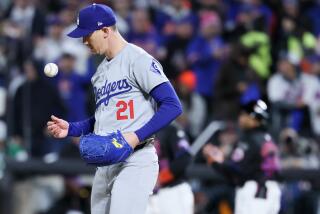Sustained by Faith
- Share via
The transaction notice moved May 10: “Los Angeles Dodgers CF Brett Butler will miss the remainder of the season.”
A possibility, it seemed, for a man diagnosed with throat cancer and facing two surgeries and weeks of radiation treatments.
But Brett Butler has spent most of his life proving people wrong, and his strong religious faith, coupled with a desire to defy the odds, is what drove him through weeks of therapy at a New Orleans rehabilitation center, in preparation for next week, when he will don his Dodger uniform again.
“I’m determined to play, because they told me I couldn’t do it,” Butler said recently. “I’ve been told [that] my whole life. That’s the fiber of my being. . . . If you’re told you can’t do it, prove them wrong.”
Butler--the Dodgers’ leadoff hitter, centerfielder and, some say, soul--underwent surgery three months ago and finished radiation therapy last month. Cancer-free, he plans to mark his recovery by rejoining the Dodgers in Montreal on Monday.
“Actually, I’m better than I thought I would be,” Butler said. “I’ll know in four or five weeks if it [playing with the team this season] is going to be a reality or not.
“My foremost concern . . . is my health. I’m dealing with that first. If I can get my immune system built up, and I can deal with all of those things, everything else is gravy. Then, if I can . . . help the club, that’d be great.”
*
Doctors discovered a cancerous tumor in Butler’s throat during a routine tonsillectomy in May. At that time, the 39-year-old veteran announced that his playing days were over. After 18 years as a ballplayer, he planned to retire to his suburban Atlanta home. “I’ve had a good career,” Butler said at the time.
But since an additional surgery to remove a lymph node from his throat was performed--followed by 32 doses of radiation over the next six weeks--tests have shown no malignancy in the remaining lymph nodes and no evidence of cancer in his blood, doctors said.
And Butler has resumed training with a vengeance, spending two to three hours each day, five days a week, working with Dr. Mackie Shilstone, director of the sports performance program at Kenner Regional Medical Center in suburban New Orleans, on exercises to build his stamina and restore his skills.
As Butler grew stronger through his daily workouts, so did the urge to rejoin his teammates.
“At first [playing] was on the back burner, because I was more concerned with the tonsillectomy and the pain I had,” Butler said. “I mean, for nine days, I was in excruciating pain. I couldn’t sleep. I couldn’t eat. I couldn’t swallow.”
Swallowing still presents Butler with one of his biggest challenges. Before he eats, he must numb the back of his throat by swabbing it with xylocaine, an anesthetic, to protect against the searing pain.
“This is what I’ve missed most--eating,” he says, taking a bite of a tuna filet. “Just the taste of food and, actually, just trying to eat something without it burning my throat.”
As a result, Butler, who is 5-foot-10 and weighed 163 pounds before the surgery, was down to 144 pounds when he reported to Shilstone this month. But he has gained weight since his training regime began, and will report to the Dodgers at 160 pounds.
And mentally, Shilstone said, Butler is as strong as ever. He has no mental scars from his bout with cancer, “absolutely none,” said Shilstone, who has worked with Butler during 10 off-seasons.
Butler said fear was his first reaction to the news that he had cancer. “The first thing you think about is death--’Well, I’m going to die; I’m going to die.’ . . . From there you get the fear factor.”
But his religious faith has carried him through the most difficult times. “For me, being a born-again Christian, it was, ‘OK, Lord, what the heck’s going on?’ I was only 38 years old, and I really had to get my thoughts and my wits about me. Once I was able to do that, we were able to deal with it.”
The primary thing troubling Butler now is residual pain in his right--non-throwing--shoulder, caused by nerve damage from the surgery and radiation.
“With the nerve damage, all you can really do is just let it come back on its own,” Butler said. “It’s not like a pulled muscle or a strain, where you work it back into shape.”
And except for the weight loss, Shilstone said there has been no noticeable deterioration in Butler’s physical condition.
“I know other athletes who would have quit,” Shilstone said. “His will is his strongest attribute.”
More to Read
Are you a true-blue fan?
Get our Dodgers Dugout newsletter for insights, news and much more.
You may occasionally receive promotional content from the Los Angeles Times.






